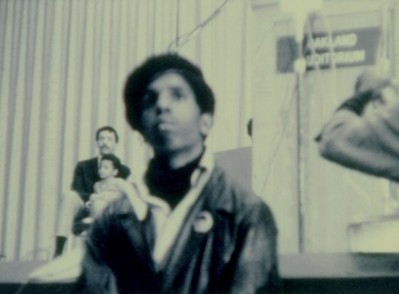Screening

For the first program in our series FILMS FOR SOCIAL CHANGE: REVISITED AND EXPANDED, join us at Light Industry on February 20th at 7:30pm to see five films by Dutch sociologist and filmmaker Leonard M. Henny (founder of "Films for Social Change"), curated by FMC Executive Director Dr. Tom Day.
Absent from the footnotes of even the most granular histories of nonfiction cinema and radical art, the films of Dutch sociologist Leonard M. Henny are compact windows onto the capacious concerns of the Left in the late 1960s and early 1970s. Made in collaboration with a range of activist and artistic groups in the United States—from the Black Panthers and the Committee for Draft Resistance to The Art Ensemble of Chicago and the St. Louis collective Black Artists Group—Henny’s American films explore, often presciently, topics like antiwar and antinuclear activism, the afterlife of soldiers following the war in Vietnam, racial capitalism, and environmental inequity. Their style combines the immediacy of vérité with moments of dialectical montage reminiscent of Santiago Álvarez; at the time, Henny would advocate for ‘Films as Weapons in the Struggle to Liberate the American Mind,’ as stated in the title of his 1970 contribution to the journal Insurgent Sociologist. Henny produced some sixteen documentaries during his lifetime, each one expanding upon his ongoing theorization of film as a form of ‘visual sociology.’
Beyond his own film practice, Henny realized the potential of cinematic sociology by fostering an ecosystem of film production, distribution, and exhibition that would privilege what we might more accurately class as militant leftist filmmaking. Henny spearheaded the nonprofit distributor Films for Social Change, which supported the efforts of dozens of filmmakers, including Barry Bialik, Les Blank, Jeff Nye, and Warren Haack. Headquartered in St. Louis and then later New York City, Films for Social Change also had a European operation running out of the University of Utrecht, where Henny taught. Henny’s work with Films for Social Change was central to a nexus of institutions that appeared around this time in the Netherlands, including Cineclub Vrijheidsfilms (Freedom Films) and Amsterdam Newsreel, outfits that were modeled in part on Newsreel and The Film-Makers’ Cooperative in New York. Henny would continue to teach at Utrecht and advocate for radical cinema throughout his career, paying particular attention in later years to the promotion of Indigenous filmmaking.
The films presented here will soon undergo preservation as part of a collaboration between the Coop and the Eye Filmmuseum in Amsterdam.
***
PROGRAM:
- Peace Pickets Arrested for Disturbing the Peace, 1967, 16mm, 7 min.
- The Resistance, 1968, 16mm, 16.5 min.
- Black Power, We're Gonna Survive America, 1968, 16mm, 15 min.
- Dead End Street?, 1970, 16mm, 11 min.
- Vietnam Veteran, 1973, 16mm, 17 min.
Total Run Time: 67 minutes.